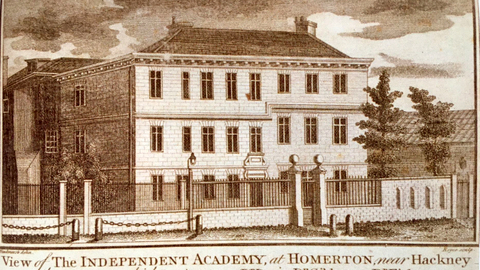HOMERTON COLLEGE
Founded in the late 17th century as a non-conformist academy, the College had strong ties to public service as well as to higher education, and over the centuries produced alumni of considerable influence, including prominent dissenting thinkers, missionary explorers, educationalists, and politicians. A fund was established in the city of London as early as 1695 to provide for the education of Calvinist ministers, offering an alternative to Oxford and Cambridge Universities from which dissenters were barred by law.
By 1768, they had purchased a large house in Homerton High Street, Hackney accommodating about twelve students a year, together with a few other 'private scholars', taught by resident tutors. The last years of the 18th century and beginning of the 19th were a golden age for Homerton College, producing some of the nationís foremost dissenting figures, including the radical MP William Johnson Fox (1786-1864), and more than its fair share of missionary explorers and translators. By 1817 the institution was known as 'Homerton Academy Society' and then 'Homerton College Society'. For a time, it was affiliated to the University of London, but after the transfer of its theological teaching to New College London in 1850, Homerton was re-founded by the Congregational Board of Education for the training of teachers, both men and women, for elementary schools. In 1894 the College moved to Cambridge acquiring the buildings of former Cavendish College between Hills Road and the railway, forming the core of the College today and the College became women-only College. Over half a century it steadily built strong academic links with the University and to accommodate growth of student numbers, after the Second World War, the new Queenís Wing was built. More formal working relationships with the University, where mixed residential colleges were at last permitted and in 1976 Homerton once again admitted men and gained recognition as an 'Approved Society' of the University of Cambridge. From the 1990s Homerton had a refurbishment and rebuilding programme and in 2001 it converged with the University and in 2010 Homerton was awarded a Royal Charter as a self-governing college of the University of Cambridge. An early Suffolk tutor at Homerton was James Conder and later Suffolk artists who studied at Homerton include Sally Ann Bassett, Emily Alice Cole and Susan Whatling.
Website: https://www.homerton.cam.ac.uk
Works by This Artist

|
|